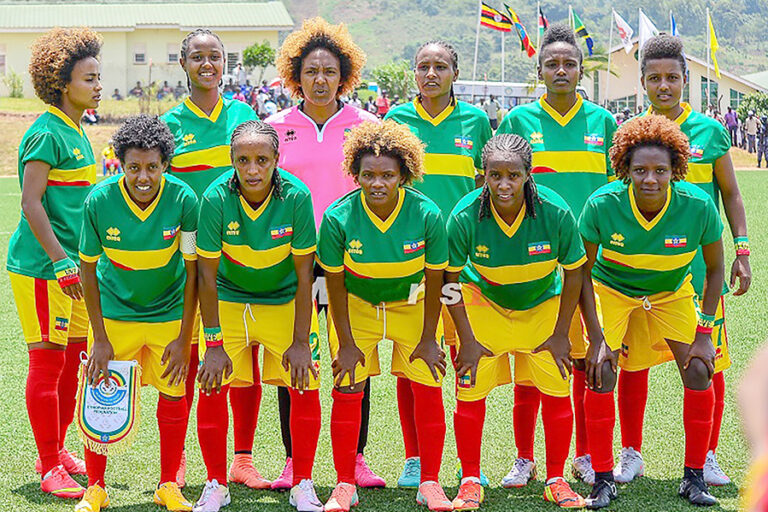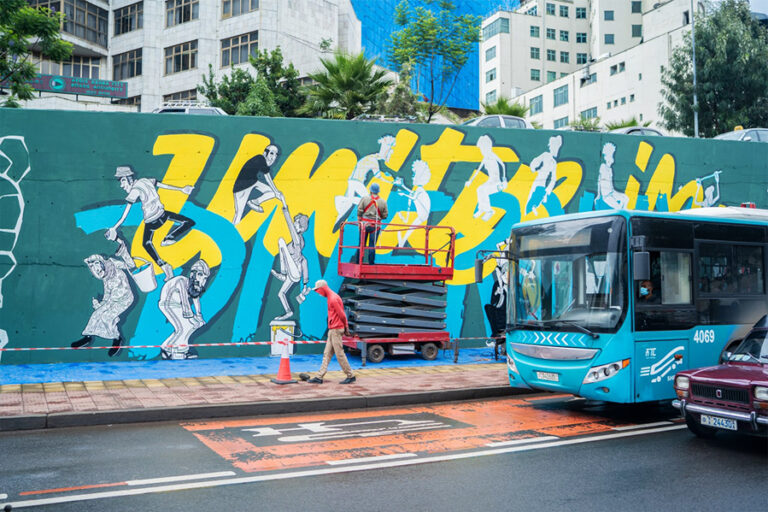The draw for the extended 2022 Women’s African Cup of Nations brought Ethiopia to a two leg head-on clash with Uganda while African heavy weights Nigeria and Ghana set for a phenomenal qualification showdown. U-20 Ethiopian Women’s side awaits the winner of South Sudan and Rwanda in the 2022 African qualification for the U-20 World Cup final to be held in Costa Rica.
112th in the latest Coca Cola World Ranking Ethiopian Lucy faces a regional adversary Uganda which ranks 154th. The first round will see Kenya play against South Sudan as Uganda face off against Ethiopia, Eritrea against Burundi, while Djibouti will confront Rwanda.
Should the Kenyan Starlets proceed past South Sudan, they are set to face off against either Uganda or Ethiopia in the second round. The winners on aggregate will qualify to join hosts Morocco in the regional showpiece.
The first and second leg fixtures of the first round will be played between June 7 and June 15, while the second round’s first and second leg fixtures will take place between October 18 and October 29.
Ethiopian Lucy to lock horn against Uganda in African Cup of Nations qualifier
What it will take to overcome the pandemic
Although the COVID-19 pandemic has hit some communities, countries, and regions much harder than others, it also has reminded us that our fates are intertwined. There will be more pathogens with pandemic potential in the future, but whether they inflict such catastrophic costs will be entirely up to us.
As special envoys on COVID-19 for the director-general of the World Health Organization, we have witnessed firsthand the intensity of the suffering caused by the pandemic, especially in poorer communities. This profound tragedy has been evolving before our eyes and still is nowhere near its end.
In our experience, the first priority in responding to an infectious disease is to save lives and protect the health and well-being of current and future generations. At the same time, we are increasingly concerned by the tremendous social and economic damage that COVID-19 has wrought. With people everywhere struggling to preserve their livelihoods under the constant threat of the coronavirus, it has become clear that this pandemic is more than a health emergency. It has become a global whole-of-society crisis.
In this context, one of our greatest fears is that after decades of improvement, future generations’ prospects have suddenly plummeted. Some regions are experiencing a reversal of gains achieved in the past 20 years. Achievements such as higher employment, expanded essential services, and better education (particularly for girls) are at risk. So are improvements in infrastructure, water and sanitation, disease control, political stability, and governance institutions.
This loss of momentum toward the international community’s Sustainable Development Goals for 2030 will have far-reaching costs, most of which will be borne by the most vulnerable. Consider the vaccine rollout. Through extraordinary global scientific cooperation, the international community has created an Access to COVID-19 Tools Accelerator (ACT-A) to facilitate the sharing of technology, and the COVID-19 Vaccine Global Access (COVAX) facility to deliver vaccines equitably and efficiently around the world.
But while hundreds of millions of vaccine doses have been administered globally, there are deep disparities. In high-income countries, vaccine supplies are sufficient to provide for around one in four people, on average; in low-income countries, this figure drops to one in 500. At this point, it should go without saying that no one will be safe until we have made these cutting-edge technologies available to everyone. The longer we delay, the greater the risk that dangerous new variants will emerge.
SARS-CoV-2, the virus that causes COVID-19, is certainly not the last contagious pathogen that humanity will face. But it could be the last one that inflicts such exorbitant costs. Whether the next pandemic can be prevented is up to us all. Success will depend on commitments from all countries to implement the International Health Regulations, the WHO’s legal framework establishing how they should prepare for and respond to the cross-border transmission of pathogens and other health emergencies.
Beyond following through on these existing measures, world leaders should take six additional steps. First, we must dramatically scale up investment in global preparedness, so that we can spot the next potential pandemic as early as possible. There is now ample evidence of what works well, and we have gained hard-earned experience in getting the necessary systems to function as they should, everywhere. All countries should commit to sharing relevant information rapidly and ensuring its reliability.
Second, we must do more to prevent pathogens from moving to humans from animals and the environment. That means appreciating the risks of crossover transmission and adopting a “One Health” mindset that reflects awareness of biological interdependencies and our shared obligation to protect fragile ecosystems.
Third, we need to ensure that all countries can respond rapidly when the alarm bells start to ring. There is an urgent demand for more investment in local, national, and regional health systems, particularly those that currently lack the capacity for prompt detection and response.
Fourth, public officials need to demonstrate enlightened leadership by committing to, and engaging in, constructive international cooperation, without which the world will always be at risk. As WHO envoys, we are encouraged by the call from 26 heads of state and government, the president of the European Council, and WHO Director-General Tedros Adhanom Ghebreyesus for an international treaty on pandemic preparedness. This effort can provide a solid foundation for high-level coordination between governments. Ideally, it would result in a new compact designed to complement the International Health Regulations and drive a simultaneous upgrade in all national systems that need it.
Fifth, we must intensify international cooperation to develop and deliver the vaccines, diagnostics, and treatments that are necessary for achieving universal health coverage. That means building on initiatives like the ACT-A to establish a permanent forward-looking mechanism for ensuring equitable access to critical health technologies for all who need them.
Lastly, and above all, there is an urgent need to reset the response to this crisis. Everyone needs to recommit to supporting a singular and cohesive strategy that is built on equity and fairness, driven by a single-minded focus to end the pandemic as quickly as possible, and in keeping with the WHO’s mantra: solidarity, science, and solutions.
As special envoys for COVID-19, we will continue to support countries and communities as they confront this crisis. The task now is to prevent and mitigate as much of the damage as we can, which will require concerted action within and across countries to implement the right public-health policies and build capacity wherever it is falling short. Sustaining these efforts will be critical, because it will be many months even years before vaccines against current and future variants of the virus are accessible to everyone.
We urge everyone to do their part to help prevent, prepare for, and manage the next outbreak. Above all, we call on today’s leaders to muster the solidarity needed to work together for the common good. What leaders decide to do now will have implications for everyone living today and tomorrow.
This commentary is co-authored by: John Nkengasong, Director of the African Centres for Disease Control and Prevention; Mirta Roses, former WHO regional director of the Americas; and Samba Sow, Director-General of the Center for Vaccine Development in Mali.
Grand street murals by African and European artists inaugurated
Ambassador Birgitte Markussen, Head of Delegation of the European Union to the African Union inaugurated four street art murals on May 9, as part of the Europe Day celebrations in Addis Ababa, seat of the African Union. The murals were collaboratively done by artists from Africa and Europe who were actively present at the celebration, together with representatives from the diplomatic and artistic community. The event highlighted the powerful tool of art to bring the two continents, Africa and Europe closer.
The murals represent shared values of the two continents; unity, peace and mutual respect. They are tangible manifestations of the thriving Africa-EU Partnership, illustrating the cooperative principles that bind both Unions, in a positive and optimistic outlook of a common future.
These public art pieces are the contribution of the EU Delegation to the African Union, to deepen the relationship between the two continents, visualizing also the year of ‘Arts, Culture & Heritage’ as declared by the African Union.
“Our aim is to go beyond the usual perceptions we have of each other,” comments Birgitte Markussen, Ambassador of the EU to the African Union, “It’s about promoting what we have in common and what we share. There is nothing more powerful than bringing people together to achieve this, and I want to congratulate the artists coming from different countries for their excellent work and cooperation”
The murals are found on three walls under Pushkin Roundabout, Roosevelt St and on the office building of the Delegation of EU to the AU.
The innovative project was launch ed in March, 2021 with an open call for street artists from both continents to apply for participation. From April 29 – May 08, artists from Africa and Europe have been painting on walls at the Sarbet underpass and the Delegation of EU to the African Union’s office premises. Selected through a widely circulated open call, street artists Mohammed Awudu from Ghana, Edoardo Trionfera from Italy, Maria Peña Coto from Spain and Wesley Van Eeden from South Africa, assisted by 8 local artists, have come together to create beautiful additions to Addis Ababa’s scenery.
ed in March, 2021 with an open call for street artists from both continents to apply for participation. From April 29 – May 08, artists from Africa and Europe have been painting on walls at the Sarbet underpass and the Delegation of EU to the African Union’s office premises. Selected through a widely circulated open call, street artists Mohammed Awudu from Ghana, Edoardo Trionfera from Italy, Maria Peña Coto from Spain and Wesley Van Eeden from South Africa, assisted by 8 local artists, have come together to create beautiful additions to Addis Ababa’s scenery.
Besides the creation of the artworks, this initiative has also been a time of skill transfer and training. The 8 local artists who served as support have had the opportunity to learn from some of the best muralists.
Pent-up demand will help propel Africa’s travel recovery once restrictions are lifted
Africa’s travel recovery will be fueled by substantial pent-up demand, according to the “Africa Travel Recovery, Opportunity & Risks Research Brief”, by Tourism Economics, an Oxford Economics Company, written exclusively for Africa Travel Week (ATW).
Lockdown restrictions have suppressed a significant amount of demand, especially for leisure travel, and the easing of restrictions and continued vaccine progress will be essential to realise this latent travel demand, the report states.
While a more youthful population has minimised the impact of the health crisis in Africa, there are concerns regarding the region’s access to vaccines. However, the COVAX initiative has helped alleviate these anxieties by providing and campaigning for a more equitable distribution of vaccines.
While we wait for a return of international visitor arrivals, stymied by renewed coronavirus outbreaks and the emergence of 501Y.V2, first reported in South Africa, a strong domestic market and an uplift in short-haul travel will support the travel industry in the near-term, adds the report.
According to the report, domestic travel is set to account for 73% of total arrivals in 2021 – up from 55% in 2019. Reduced travel appetite for far-away travel will increase the short-haul share of international arrivals in 2021 to support markets which have been traditionally more dependent on longer-haul markets.
Lastly, continued infrastructure improvements, targeted tourism support and concentrated digital marketing campaigns could help stimulate future tourism growth. Infrastructure improvements and better use of digital platforms could help increase destination competitiveness. This could add to lingering demand for less-crowded destinations with outdoor activities and attractions, which will also be fuelled by a rise in more sustainable travel.
“While we grapple with the ever-changing environment, this Tourism Economics Report, compiled exclusively for Africa Travel Week, shines a positive spotlight on the potential for tourism to Africa. Our role as Africa Travel Week is to keep the interest in travel to Africa burning by providing a dynamic platform for stakeholders to reconnect as we work together at Making Travel Happen Again,” says Megan Oberholzer, Portfolio Director: Travel, Tourism and Creative Industries at Reed Exhibitions Africa.






